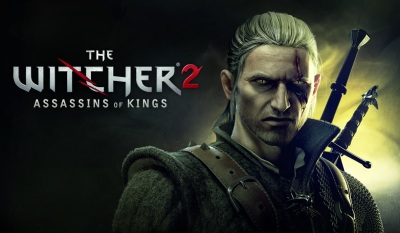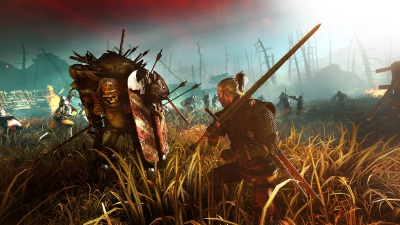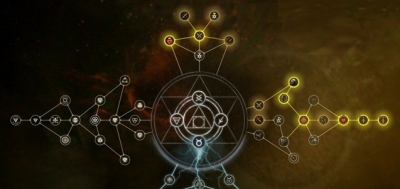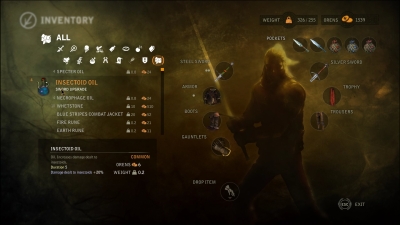07.22
Firstly, don’t worry, this is another of our spoiler free guides. We’ll be taking you through the basics and ensuring you have a good stable platform from which to enjoy playing The Witcher 2 in exactly the way you want, but we won ‘t be telling you where to go, what to say, or what decision to make. After all, the enjoyment from a game as good as this comes from the discovering…

But how to get the best from Geralt?
So what do you need to know to help you on your way? Well, there are a number of basics that, if kept in mind, will greatly facilitate an enjoyable gameplay experience.
The two most complex aspects of The Witcher 2 can mainly be categorised as Combat or Progression related.
Combat
Combat in The Witcher 2 can be exciting and fluid, or it can be infuriating and unfathomable. The key to this is understanding a little of how the developers expect you to fight and from there evolving stratagems which are compatible with this overall design.
By discussing combat basics we can later make informed decisions about which skills might be worth selecting and developing and how to progress Geralt’s equipment selections.

Doesn't look like you'll be talking your way out of this one!
So, combat, what is it all about then? Well basically two main things; Position and Timing.
When we talk about “Position” we mean both movement and orientation, in The Witcher 2 it is important at all times to keep your foe(s) in front of you, and often to get away from them quickly. Attacks from the back can quickly bring Geralt down, even from relatively innocuous foes. For this, and a number of other reasons, it is essential to master “rolling”, Geralt’s way of moving quickly whilst in combat. Luckily rolling is very simple, with a simple double tap of the required direction sending you bounding there rapidly. This is tactically vital as it allows you to escape, outflank and maneuver foes with comparative ease once practiced.
In fact, in most combat situations, all movement you make should be via “rolls”, get used to them, enjoy them, exploit them. Interestingly, your foes never roll, indeed they almost always move and react fairly slowly, making this tactic devastating. Do not expect to “face off” against foes, but rather to “dance” round them, rolling away, behind and through them to maximum advantage. This applies equally whether you have sword or spell in mind, and renders some enemy tactics, such as use of bombs and some spells, almost mute. Keep rolling, rolling, rolling.
Once you feel confident and are enjoying rolling, the next area to address is Timing. Timing, whilst not as essential as Positioning, is still required reading for this course. Timing applies both to you and your foe(s). In the same way that you can block and attack, so can your enemies, and they will. For this reason you have available to you two types of sword attack and a selection of spells.
Sword combat options are simple; “Swift” or “Heavy” attacks are relatively self explanatory. “Heavy” attacks do great damage, knock back foes and negate shields and blocking, but are slow to execute, unlikely to hit nimble foes and leave you vulnerable to attack. “Swift” attacks are, on the other hand, extremely likely to land, swift to execute but deal far less damage. The Witcher 2 will almost always present you with either a swift but lightly armoured foe; one whom you would use “Swift” attacks or a heavily armoured but lumbering one on whom you will unleash your “Heavy” attacks. It is often as simple as that if you choose the way of the sword. (Of course you must use the correct “type”of sword for the “type” of foe; “Steel” for humanoid foes and “Silver” for everything else).
The game is also very fair about informing you of opponent’s intentions, you will often see foes “winding up” to attack you, giving you the choice to then block, interrupt or avoid them. Should you land a blow, of any type, you have the opportunity to follow this up and consequent such follow ups can chain powerfully allowing you to quickly take down individuals. For this reason it is always wise to concentrate on single foes until they are downed, that is unless you see the opportunity to interrupt another foes attack. You see, an interesting aspect of combat in The Witcher 2 is that foes very, very rarely attack you simultaneously, you can expect that most of the time they will take turns! Yes, really, the engine really is that fair! ![]()
Spells should be approached carefully, whilst it is quite possible to use them extensively to deal with enemies, this is certainly the harder path. It seems the developers favoured swordplay and using spells to augment this is definitely simpler than trying to use spells exclusively.
Considering you will always have a sword in your hand in combat, a wise Witcher would do well to concentrate on swordplay, as above, and use key spells to augment this approach.
Progression
So you’ve mastered the basics, now you need to augment Geralt in such a way as to improve his capabilities and survivability.
When we talk about progression in The Witcher 2 we really mean allocating skill points, which you receive at the rate of one per level. Initially these come fairly frequently but as you progress they become more precious. There is also no way to undo your choices so careful planning is required.
Initially Geralt has access only to one of these four skill areas; Training.
Training includes basic skills which help round out Geralt’s setup. The choices here are limited, but important. In light of the combat heavy nature of The Witcher 2, concentrating on “Hardiness” and “Fortitude” are never going to bad ideas, and “Dagger Throwing” can be devastating against may stronger creatures when upgraded, finally “Parrying” is worth spending in, at least until you gain access to the other three skill areas; Swordsmanship, Alchemy and Magic.

Perhaps something looking a little like this?
Once you do have access to them experience hints that Swordsmanship is very powerful, Magic provides excellent support and tactical flexibility to it and Alchemy can be very useful in improving either of them. And that is the order in which they should be prioritised.
A very low maintenance build combines the best of Swordsmanship and Magic to great effect as follows; as soon as these areas are available develop “Feet Work” from the Swordsmanship tree & “Enhanced Quen Sign” from magic, granting you both exceptional mobility and solid defense should you mistime an attack. Following this with looking at “Position” from Swordsmanship and moving towards Magic’s “Venting” will further bolster your defence in critical situations and turn Quen’s powerful protection into an excellent offensive weapon.
Beyond these, looking at increasing your Vigor and Vitality in either / both trees should be priority, Vigor being your “energy” so to speak and Vitality your “Health” (You can also pickup Synthesis from Alchemy quite easily to this end). Once you have worked on upgrading these then one of these two “Show Stopper” skills should be your goal; “Combat Acumen” and “Sense of Magic”, these both assist you in finishing large numbers of foes in quick order and / deal considerable damage to larger foes.
So you now have a tried and tested combat strategy and some skills to seriously consider.
Equipment
There are a few things you need to know about equipment, but they are few and relatively straight forward.

Ahhhh… stuff… I love stuff… but stuff weighs… sigh…
The first thing to know about equipment is that in addition to magic, the only ranged combat on offer are daggers and bombs. Bombs can be dodged, missed and can hurt the user. Daggers suffer from none of these failings. So, in addition to your armour, swords and trophy you really must carry at least one set of daggers. Higher quality daggers offer considerable damage increases, so obviously prioritise these. Daggers should be your “get out of jail free card”; they can rip through a powerful adversary’s health surprisingly quickly, so do not use them unless you really have to. This will mean when you do need them they can turn your nightmare into a cakewalk.
Bombs are also useful, particularly for attacking grouped foes or stronger enemies. Experience says daggers (specially with upgraded “Dagger Throwing” skill) always win out, but do not disregard the humble bomb, especially if you are a fan of Alchemy. Always carry one set.
Traps further extend your strategic arsenal, but be warned, they are a little hit and miss, can be expensive and heavy to carry and can, by luck or judgement, be avoided by the AI. Also they just take longer to use!
So, we’ve reviewed some of the “consumables” we can use in combat, let’s then address armour and weapons. Happily (or sadly?) this is a simpler affair. Armour will generally become available as quest rewards, be that as a wearable piece or a recipe to craft one, or become available to purchase. As is often the case, you can usually simply wait for a reward / find one at the end of a quest rather than buying them, but be warned, if you see a recipe for equipment you like the look of, buy it, it often is not available later on.
When it comes to crafting and Alchemy, crafting simply entails finding or buying the relevant recipe, required components and asking a relevant NPC to craft it for you. Alchemy on the other hand is up to you and the regents you collect on your travels. From potions to bombs to traps, you will need to spend a little time doing this as it is cheaper, faster and more flexible doing it yourself than relying on shop inventory to supply you.
Beyond
This is where we part ways, we have spoken of what you need, now go and enjoy what you don’t!
Enjoy the characters, the plots, the gambling, the “encounters”, the scenery, the wordplay, the humour, the battle.
Good health and good fortune Witcher! ![]()

What will you discover through the forest trail?
– Richard “Rax” Burley